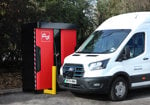Former Conservative transport minister Steven Norris claimed far too many businesses still had no programme of risk management in place for their drivers.
He expressed disappointment at the apparent apathy surrounding duty of care responsibility.
He said: ‘I don’t care what business you’re in, your staff are your greatest asset. I don’t know why there are any companies that don’t make sure that they manage the fleet properly.’
On corporate manslaughter, he said: ‘This Government is particularly keen to pursue the idea that businesses get off too easily. They are trying to find a way of prosecuting corporations as if they were individuals.
‘The difficulty has been identifying the corporate mind. Corporate manslaughter is a lot more difficult than perhaps the politicians suggest, but it’s there.’
Test driver personality too
Risk assessments should include a personality test and not just quiz a driver’s knowledge of the Highway Code.
Dr Lisa Dorn, director of the Driving Research Group at Cranfield University and currently presenting BBC1’s Road Rage School, said fleets should use psychometric testing.
The process is the science of measuring human qualities. Dorn said: ‘The more assessments you do of a driver the better chance you will have of picking up some problems.’
Her methods are based on the Driver Risk Index, which measures personality-based emotional reactions in driving.
It takes into account such factors as aggression, enjoyment of driving, hazard monitoring, thrill seeking, fatigue resistance and driver confidence.
Psychometrics can also be used to correct inaccurate risk assessments caused by drivers consciously trying to present themselves as a good driver.
Dorn concluded: ‘We have really got to start thinking about the driver and changing their psychology.’
Tax expert’s warning on NIC
National Insurance contributions will be one of the biggest tax growth areas for Government in the next few years. Alison Chapman, tax partner of the Deloitte automotive sector group, said National Insurance would be ‘the big one’.
She said: ‘People don’t think of it as a tax but it’s a very good revenue generator. The cost of NI is likely to go up for employers.’
Chapman said the 1% NI charge on earnings above £32,760 could rise to 5% within the next five years.
ECO schemes are getting more simple
The scepticism over employee car ownership (ECO) schemes is unfounded and drivers should now find them easier to understand.
Adam Trevaskus, head of corporate and Whitechapel for Lloyds TSB autolease, said a survey suggested that a third of fleet managers know very little about ECO schemes.
Trevaskus said: ‘It’s a complex issue and people have criticised it but it’s getting simpler - the architecture is becoming more streamlined.’
Experts give their views on hottest fleet topics
David Bayliss, director of engineering company Halcrow Consulting, was a member of the Royal Academy of Engineering working party that produced a report to the Government recommending the introduction of road pricing.
He explained the reasoning behind what has proved a controversial idea. It was important, Bayliss said, that motorists pay the true cost of using the roads, using the latest technology. He suggested that the cost to motorists would not be hugely different to existing taxation, but it would be used in a much more efficient way.
The money raised would cover asset charges, maintenance, management and policing of the road, as well as the indirect charges of congestions, pollution and accidents.
Terry Avery, corporate fleet manager of the City and County of Swansea, shared with delegates his experience of adopting an LPG fleet, which started well but has since worsened. In 1997 the council took on 40 LPG vehicles. He said: ‘Although the economics of LPG were favourable this has now been reduced by the withdrawal of grants.
‘In recent years petrol and diesel engines have improved dramatically so for people who want to clean their fleet all they need to do is keep their vehicles up to date. LPG is starting to lose momentum.’
Jonathan Nash said: ‘I know for sure that biofuels are coming and in a big way.’
Biofuels are produced from renewable and sustainable sources such as sugar beet, sugar cane and grains and are already available in various blends with traditional fossil fuels. The 9-5 Biopower can run on either bioethanol or petrol, but is unusual among alternative-fuelled vehicles in producing 20bhp more and 15% extra torque as a result.
Richard Tarboton, head of the transport business unit at the Energy Saving Trust, believes that growth of low carbon vehicles will only happen when buyers change their attitudes to climate change.
He said: ‘Technology is vital. Technology and fuels are here today – the challenge is bringing them to the mass market.’















Login to comment
Comments
No comments have been made yet.